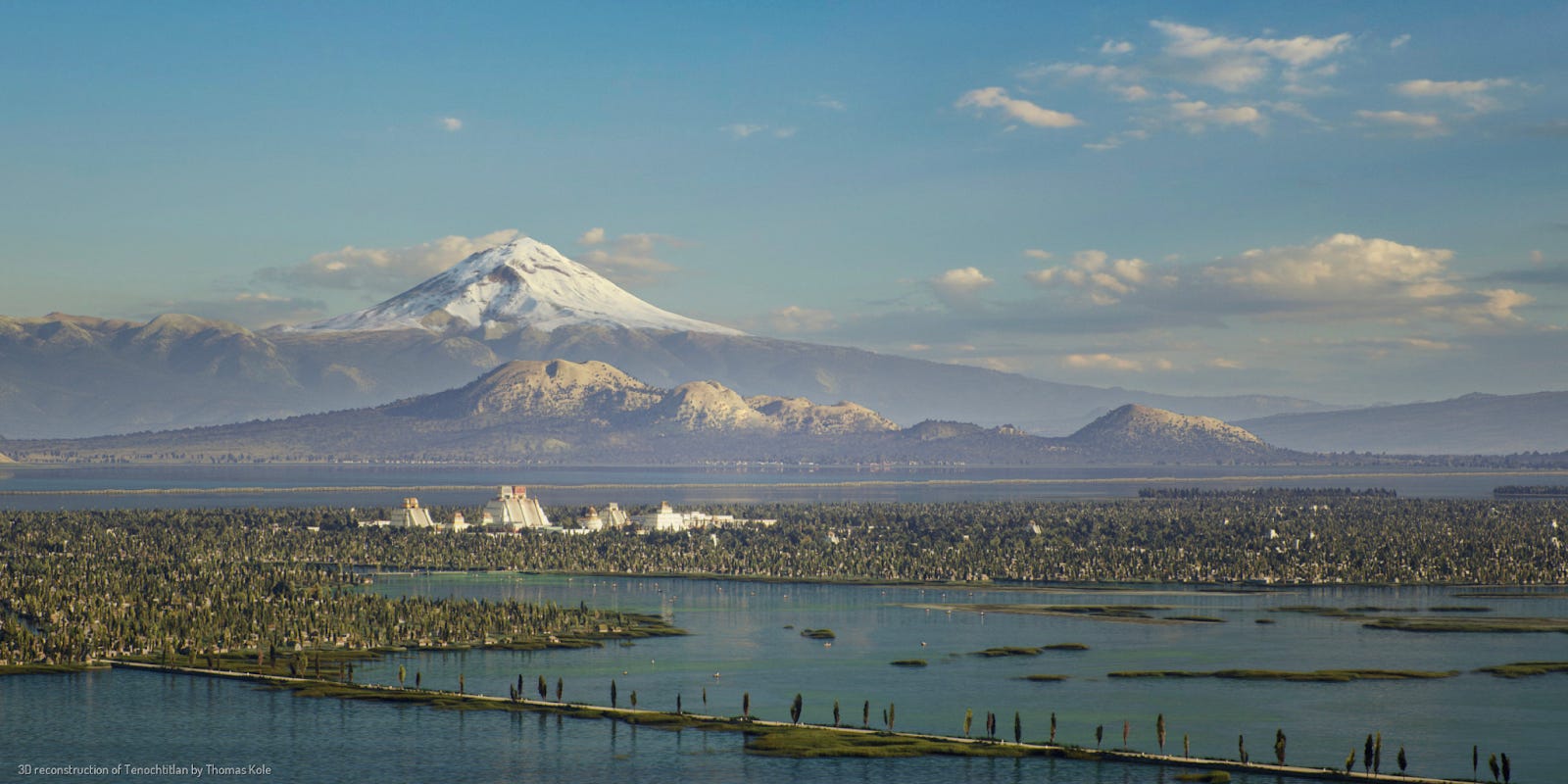Welcome to our quarterly update, where I share new information relevant to topics we’ve touched in the past. I’ll break this into 3 articles over this week and next: Today and next Tuesday, you’ll receive articles with updates on many topics, with a paywall halfway through. This Friday, I’ll send a deep dive on how AI is transforming jobs right now for premium subscribers only.
TODAY
Energy & Climate Change
Climate Change’s Canary in the Coalmine
Solar Energy Is Saving the World
Europe’s Independence from Russia
How Many People Will Climate Change Kill?
Startups Want to Fertilize the Ocean
Hydrogen Is Worthless
Corn Fertilizes Itself
German Nuclear Plants Might Reopen
Adjust Your Anxiety
Beyond the paywall:
Geography
This Is What Tenochtitlan Looked Like
Ethiopia’s War, Survival, and the Sea
The Viking Footprint in the UK
Chile Is Even Longer than You Think
Brazil Keeps Fertilizing Its Shield
How Canada Is the US’s Lapdog, and the Legality of Israeli Settlements
Sex
Why Are Young Men Violent?
Beauty Standards Are Not Fully Innate
Why Do Women Have Breasts?
Why Men Like Women More than the Other Way Around
How Pre-Cum Fights the Vagina
THIS FRIDAY: Premium-only: How AI Is Affecting Jobs Today
NEXT WEEK
News
My Accuracy of COVID Economic Forecasts
Is the Placebo Effect Real?
Could We Cure Lyme Disease?
How Is the Malaria Vaccine Working?
Argentina Games the System with the Big Mac Index
We Don’t Know Who Will Commit Suicide or How to Reduce its Odds
Other
Will English Rule the World?
Where to Look for Life in the Universe
Transportation Lines Define City Success
The Space Economy Is Booming
Mental Breakdown of Young People
We Shrink Animals
How Much Will We Work from Home?
Why Korean Dramas Beat Chinese Dramas
How Substack Fulfills Its Destiny
Don’t Read the News
The Benefits of Obsession
Enjoy!
Energy & Climate Change
Climate Change’s Canary in the Coalmine
What is the first industry to pay the costs of climate change?
Insurance.
So when the insurance market is telling us that some areas previously insurable have become uninsurable due to the weather, we should pay attention.
As
explains in The Climate Brink, dozens of insurance companies have left US states like Florida, Louisiana, and California, including some of the biggest ones. Home insurance premiums in Florida are 4x higher than the average US premium, and even then, they’re too risky for private insurers.The problem with insurance is that it’s a hidden support for many other things:
If you can’t afford insurance—or if it’s not available—you’re less likely to buy a house (or you might even not be able to).
Which means demand for housing goes down, and people leave an area or don’t come at all.
Which means the tax base erodes.
Which means there are fewer social services.
Fewer people and fewer services means social decay.
Which further fuels the cycle.

This underlines the core climate change issue: Although not an existential issue, it is a climate and economic issue, which can evolve into a social and regional issue, and even a national one.
If only we knew how to solve this problem!
Solar Energy Is Saving the World
In Solar Energy Solves Global Warming, I claimed that the seemingly intractable problem of global warming is on pace to be solved by capitalism—namely solar energy. Here’s a new paper:
We now know that continued use of fossil fuels associated with 1.5–2°C scenarios would result in hundreds of millions of pollution deaths and likely trigger multiple tipping elements in the Earth system. The cost of renewable technologies has plummeted at least 30 years faster than projected, and renewables now dominate energy investment and growth. This renewable revolution creates an opportunity and responsibility to raise our climate ambitions. Rather than aiming for climate mitigation—making things less bad—we should commit to climate restoration—a rapid return to Holocene-like climate conditions where we know humanity and life on Earth can thrive.—Accelerating the Renewable Energy Revolution to Get Back to the Holocene, Abbott et al.
Exciting!
These are the sources and sinks of energy today:

And this is in two decades, with cheap solar energy:
Europe’s Independence from Russia
Europe was very dependent on Russian gas before Russia invaded Ukraine. In less than two years, it has dramatically cut this dependency. Exports of Russian gas to Europe are down 85%. What remains is exported to Czechia, Slovakia, and Hungary—three countries that are more pro-Russian today than other EU countries. But as Europeans build their own gas infrastructure, they are on track to achieve independence from Russian imports next year, at which point support for Russia in Europe might further weaken, together with Russia’s budgets.
The largest producer and exporter of natural gas is vanishing from global markets in less than four years, and that is absolutely unprecedented.—Peter Zeihan.
Good job, Europe!
How Many People Will Climate Change Kill?
In 24 Surprising Facts about Climate Change, I explain how deaths might shrink with climate change, because of fewer cold deaths (they currently account for the majority of climate-related deaths) while we will adapt to heat, resulting in fewer heat-related deaths.
This graph shows the change in deaths in the US by increase in global temperatures, depending on whether we adapt well (green) or not at all (blue):
From the article:
Climate change decreases temperature-related U.S. mortality by (roughly) a few thousand per year for global warming below 3.2ºC. This occurs because the reduction in cold-related deaths exceeds the increase in heat-related deaths.
For warming above 3.2ºC, the sign of the answer depends on how well we adapt. If adaptation is effective, temperature-related mortality will continue to decrease.
But this is only true for the US. And it’s not true everywhere in the US. In the north, there may be more deaths. In the south, there might or might not, depending on our adaptation and actual temperature increases. In any case, nothing bad seems to happen up to 2.5ºC increase.
This is an equivalent analysis for other parts of the world and suggests the cost of death increases will be equivalent to 3.2% of global GDP.
Startups Want to Fertilize the Ocean
In Farm the Ocean, I exposed the idea of dropping iron in the ocean, which would dramatically increase life in them—including fish that we could eat and other animals that we could enjoy.
Some startups also think pulverizing iron above the oceans would transform methane into CO2, which would be good for the environment because methane causes much more global warming than CO2. A natural form of this process might have caused ice ages in the past from continental dust. I’m all in favor!
Hydrogen Is Worthless
In Why Hydrogen Is Not the Answer, I assert that Hydrogen is not that useful as a power source unless it’s immediately transformed into something else. Otherwise, it’s too light and explosive.
There are some signs that the market is bearing this out:
Shell has quietly scrapped previously announced plans to build 48 new light-duty hydrogen filling stations in California, despite having been awarded $40.6m of government grants back in 2020 for the initiative—Source.
Denmark has scrapped all the Hydrogen fuel stations it had:
The plan was for Danish owners and users of hydrogen cars to be able to refuel their cars at up to 19 stations across the country starting from 2024. Instead, there will not be a single hydrogen station in Denmark.—Source.
Corn Fertilizes Itself
In The Nutrients of Life and a Better Alternative to Iron Fertilization, we discovered that one of the biggest limiting factors for plant growth is nitrogen. Certain plants and algae are able to extract it from the air (N2), but that’s very rare and requires a lot of energy.
Some corn can also do that, and scientists are trying to figure out ways to get standard corn (and other plants) to do it, too. If they succeed, it would mean less need for fertilizer and less energy consumption, since nitrogen is the biggest component of fertilizers and requires a lot of energy to produce.
German Nuclear Plants Might Reopen
In Why Germany Won’t Keep Its Nuclear Plants Open and a couple other articles, we uncovered why Germany was shutting down its nuclear plants: because of irrational political pressure from the Green Party.
Eventually, the six remaining nuclear reactors closed, but they are in great condition—as required by German law—and could be reopened at any time.
Now the leader of the CDU, the biggest German political party, says he will restart the nuclear plants if his party returns to power.
This would be good, because so far, renewables have increased poverty and inequality in Germany.
Adjust Your Anxiety
Through my climate change articles, I realized that global warming is a massive problem, but not an existential one. I also realized that we can solve it if we actually want to. Maybe that’s why people who possess 𝗺𝗼𝗿𝗲 overall environmental knowledge have 𝗹𝗲𝘀𝘀 climate anxiety.

You should also adjust your anger, because if you’re angry about climate change, you’re less likely to do something about it.

This doesn’t mean climate change is something we should ignore. It’s very much a present-day problem.
The Accuracy of COVID Economic Forecasts
From Coronavirus: Out of Many, One:
What history teaches us is that, usually, after a pandemic, the economy goes back to normal. The decisions we take will have a tremendous impact this year and next, but economically, in a few years it’s likely that the impact will be minimal.
This was a super bold claim back then. How could the worst pandemic in history, that was devastating economies, causing trillions in losses, result in only a small economic trough?
Here’s the update:
See you at the end of my victory lap.
Geography
This Is What Tenochtitlan Looked Like
In A Connected Place and A Brief History of the Caribbean, we explored the surprising city of Tenochtitlan. But I was never happy with the depictions. Now, Thomas Kole has taken all we know about the city and created an amazing series of realistic representations. Look!
Go to the site to see more!
How Canada Is the US’s Lapdog
Keep reading with a 7-day free trial
Subscribe to Uncharted Territories to keep reading this post and get 7 days of free access to the full post archives.













